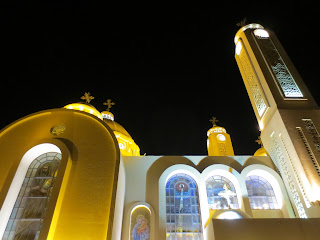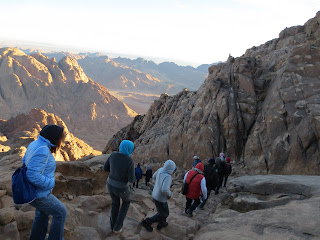It had taken a while, but I was finally beginning to feel the rush of excitement that comes with traveling and seeing some of the wonders of humanity's history (even if it was only a twinge of the excitement).
The sun had set, but I had arrived just in time to see the last of the natural light reflected off of the buildings. When combined with the old sulphur lights starting to kick in, there was a definite "glow" to the entire complex. Walking through the temple in this glow felt special. It felt like what I was doing was something rare and to be prized.
As the light of the day continued to fade, the glow of the building became more intense. The power of the lights began to dominate the ruins more and changed the entire look of the ruins. The yellow glow of the ruins had been replaced by the bright spots of light from the sulfur lamps .
I walked through the entire ruins a second time to give myself an opportunity to see them all with their different appearance. They now looked like some precious ornament sitting inside a display case. The yellow glow was gone, but now there was an intense brightness to them.
As I walked closer, I could also see the vibrant colours of the hieroglyphs. The light of the day had obscured them, but the focused light of the lamps made them shine.
I was on the cruise, sitting on the top deck quietly drinking my tea when I could see that we were approaching a large gathering of boats. The light was beginning to fade as the boat pulled into the mooring. Even from a distance, it was promising to see the yellow structures that seemed to protrude out of the hillside.
We had arrived at the Temple of Kom Ombo. It was the Ptomelaic temple dedicated to the crocodile god Sobek .... or something like that anyway.
Stepping ashore, I was immediately swarmed by the touts. The familiar screams and pleas were falling on deaf ears as I became more accustomed to the approach of "Egyptian tourism". Walking up the stairs towards the temple, I was also greeted by the now even more familiar sight of empty tourist facilities and row after row of unused chairs in the cafes and restaurants. The collapsed tourism industry was constantly reminded to any one who still dared to enter this country. I couldn't help but wonder whether this collapse had added to the desperation of the touts or if that was something that was an innate part of the industry in its own pernicious way.
I continued walking up the stairs and to my relief I saw that the actual temple grounds were fenced off and would provide me with respite against the unrelenting touts. I paid for my ticket and went inside. Protected from the constant harassment of the touts, I was able to calmly absorb the beauty of the place.
It was indeed very beautiful as a monument to the wonders of the past. This was what I had traveled across the world to see. I wanted to be surrounded by the marvels of humanity's achievements.The sun had set, but I had arrived just in time to see the last of the natural light reflected off of the buildings. When combined with the old sulphur lights starting to kick in, there was a definite "glow" to the entire complex. Walking through the temple in this glow felt special. It felt like what I was doing was something rare and to be prized.
As the light of the day continued to fade, the glow of the building became more intense. The power of the lights began to dominate the ruins more and changed the entire look of the ruins. The yellow glow of the ruins had been replaced by the bright spots of light from the sulfur lamps .
I walked through the entire ruins a second time to give myself an opportunity to see them all with their different appearance. They now looked like some precious ornament sitting inside a display case. The yellow glow was gone, but now there was an intense brightness to them.
As I walked closer, I could also see the vibrant colours of the hieroglyphs. The light of the day had obscured them, but the focused light of the lamps made them shine.
I walked back to the boat feeling satisfied with what I had seen. It was a feeling that had taken longer than I expected to come on this trip.


























































